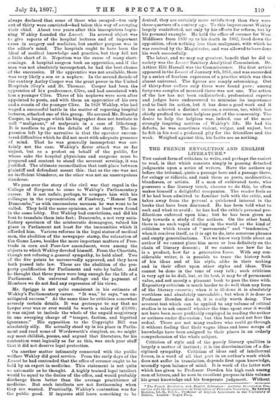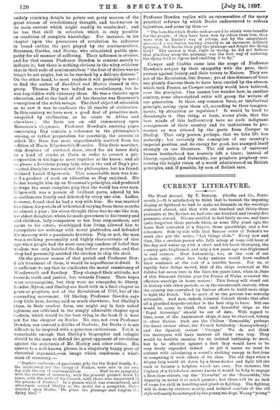THE FRENCH REVOLUTION AND ENGLISH LITERATURE.*
THE easiest form of criticism to write, and perhaps the easiest to read, is that which consists simply in passing detached judgments upon a series of writers. Have the authors up before the tribunal, quote a passage here and a passage there, for eulogy or ridicule, and rank them as poets, mediocrities, blunderers, or artists. If a man of cultivated taste, who possesses a fine literary touch, chooses to do this, he often makes himself a delightful companion. The reader feels as if he had been admitted to familiar talk with the critic, and takes away from the perusal a quickened interest in the books that have been discussed. He has been told what to seek and what to avoid ; he has had the critic's personal pre- dilections enforced upon him ; but he has been given no help towards a study of the authors. On the other hand, there is no such vapid reading in the world as the kind of criticism which treats of " movements " and "tendencies," when it resolves itself, as it is apt to do, into sonorous phrases and empty generalisations. Yet we know very little about an author if we cannot place him more or less definitely on the chain of literary descent ; if we cannot see how far he is a product, how far a generative force. With any con- siderable writer, it is possible to trace the history both of his ideas and of his style, alike in their making and in their effect upon other styles and ideas. This cannot be done in the tone of easy talk ; such criticism is very apt to be dull, but, at its best, it may be of permanent value, and not merely a pleasant book to pass the time with. Expository criticism is much harder to do well than any form of the literary causerie ; when it is ill-done it is absolutely worthless and absolutely unreadable ; but when it is done as Professor Dowden does it, it is really worth doing. The severest test which can be applied to any volume of critical studies is to ask oneself whether the time spent over it would not have been more profitably employed in reading the author or authors under discussion ; but this book need not fear the ordeal. There are not many readers who could go through it without feeling that their vague ideas and loose scrape of knowledge have been assigned to their places in an orderly comprehension of the whole subject.
Criticism of style and of the purely literary qualities is largely a matter of instinct; it is the discrimination of a dis- ciplined sympathy. Criticism of ideas and of intellectual forces, in a word of all that part in an author's work which does not suffer in translation, depends first upon knowledge, secondly upon balance of mind. It is work of the latter sort which has given to Professor Dowden his high rank among men of letters, and he uses to excellent purpose in this volume his great knowledge and his temperate judgment. Without • The Preach Revolution and English Literature Lectures Delivered in Con- nection with the Sesquicentenn ia/ Celebration of Princeton University. By Edward Bowdon, LL.D., D.O.L., Professor of English Literature in the University of Dublin. London : Began Paul. unduly straining details he points out petty sources of the great stream of revolutionary thought, and backwaters in its main current which might readily be overlooked ; and he has that skill in selection which is only possible on condition of complete knowledge. For instance, in his chapter upon the precursors of revolution he indicates in broad outline the part played by the sentimentalists, Rousseau, Goethe, and Sterne, who stimulated public sym- pathy for all manner of suffering. Their influence is obvious, and for that reason Professor Dowden is content merely to indicate it; but there is nothing obvious in the witty criticism that in their code of sentimentalism "the first of duties was no longer to act aright, but to be touched by a delicate distress." On the other hand, to most readers it will probably be nova to find the author of Sand ford and Merton classed in this group. Thomas Day was indeed no revolutionary, but he was hag-ridden with visionary ideas. He was a theorist upon education, and at the back of all his theories was Rousseau's conception of the noble savage. The chief object of education as he saw it was to eradicate the ill results of civilisation. In this century we have seen a good deal of primitive man, unspoiled by civilisation, as he exists in Africa and elsewhere ; the facts are an odd commentary upon Rousseau's eloquence. Professor Dowden's amusing pages concerning Day contain a reference to the philosopher's wooing, or rather preparation for courtship, the account of which Mr. Hare has most unpardonably omitted from his udition of Maria Edgeworth's Memoirs. This Stoic martinet, this despiser of outward show, stood for six hours daily iii a kind of stocks at Paris in order to correct a pre- isposition in his legs to meet together at the knees ; and all t o please a frivolous young lady, who at the end of Day's pro- T I acted discipline married, not the philosopher, but his friend, Richard Lovell Edgeworth. This remarkable man was him- • a product of such an education as Day enjoined. His father brought him up on Rousseau's principles, and produced pPrhaps the most complete prig that the world has ever seen.
Igeworth was a person of brilliant parts, adored by his niiscellaneons family and detested by every one else. Ladies, however, found that he had a way with him. He was married five times, his periods of widowhood varying from three months to almost a year ; his wives thought there was no one like him, his eldest daughter, whom he made governess to his twenty and odd children, lady-companion to her four step-mothers, and agent to his estate, worshipped him living, allowed him to interpolate her writings with moral platitudes, and defended his memory with a passionate devotion. Prig or not, the man was a striking personality and highly characteristic of that age when people had the most amazing candour of belief that wisdom was only hatched the day before yesterday, and that they had personally assisted the chicken to chip the shell.
On the greater names of that period and Professor Dow- dm's treatment of them, it would be superfluous to dwell. It is sufficient to say that he vindicates the moral consistency of Wordsworth and Southey. They changed their attitude, not towards truth and justice, but towards France. Their hopes were over-sanguine, but they were no renegades to liberty. Landor, Byron, and Shelley are dealt with in a final chapter as poets or prophets, not of the Revolution of 1789, but of the succeeding movement. Of Shelley, Professor Dowden says very little here, having said so much elsewhere ; but Shelley's ideas, in their crudest form, one might say in their naked ugliness, are criticised in the simply admirable chapter upon 4.1odwin, which would be the best thing in the book if it were not for the chapter on Burke. No one, not even Professor Dowden, can conceal a dislike of Godwin ; for Burke it is not difficult to be inspired with a generous enthusiasm. Yet it is remarkable enough that Shelley's biographer and eulogist should be the man to defend the great opponent of revolution against the strictures of Mr. Morley and other critics. His answer to a well-known phrase is a singularly happy piece of rhetorical argument—an image which condenses a whole train of reasoning :—
" Burke's outbreaks of passionate pity for the Royal family, fu: the aristocracy and the clergy of France, were met in his owu
day with the cry of sentimentalism Had he no sympathy with the victims of monarchy, with the peasant ground down by taxes, with the serfs of the Church, with those who languished in the prisons of France ? In a phrase which was remembered, and afterwards served Shelley as the motto for a pamphlet, Paine retorted upon Burke,'Be pities the plumage and forgets th dying bird.' " Professor Dowden replies with an enumeration of the many practical reforms by which Burke endeavoured to redress injustices, and sums up thus :—
"The benefits which Burke endeavoured to obtain were benefits for the people; if they have been won by others than him, they were won in Burke's way of reform, not by the sanguinary process of a revolution leading directly to an enormous military tyranny. Did Burke then pity the plumage and forget the dying bird ? The answer is that, right or wrong, he did not believe that plucking away the plumage was the best way of restoring the dying bird to vigour and enabling it to fly."
Cowper and Crabbe come into the scope of Professor Dowden's subject by their sympathy with the poor, their protest against luxury, and their return to Nature. They are not of the Revolution, like Burns ; yet at this distance of time one plainly discerns them to have been carried by the stream which took France, as Cowper certainly would have believed, over the precipice. One cannot but wonder how, in another century, some clear-sighted critic will group the writers of our generation. Is there any common force, or intellectual principle, acting upon them all, according to their tempera- ments, by attraction or repulsion ? It would be bard to disentangle it. One thing, at least, seems plain, that the best minds of this half-century have no such indignant arraignment of their country and its institutions to pro- nounce as was uttered by the poets from Cowper to Shelley. That only proves, perhaps, that we take life less seriously ; but certainly the conception of our country's imperial position, and its energy for good, has stamped itself strongly on our literature. The old notion of universal human brotherhood has scarcely left a trace; instead of liberty, equality, and fraternity, our prophets prophesy con- cerning the bright vision of a world administered on British.
principles, and, if possible, by men of British race.



































 Previous page
Previous page